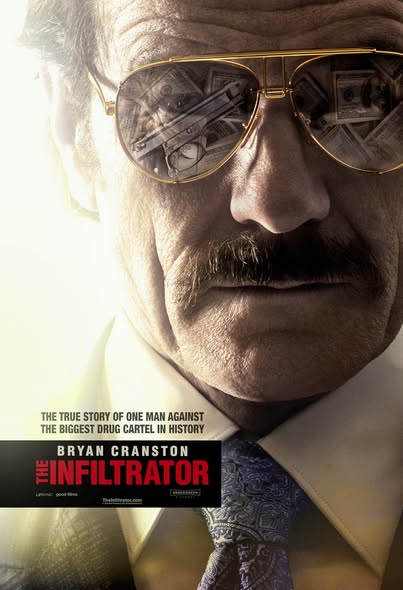The Infiltrator (2016)

The Infiltrator is a 2016 crime drama directed by Brad Furman, based on the true story of Robert Mazur, a U.S. Customs agent who went undercover to infiltrate drug cartels and money laundering operations in the 1980s. The film stars Bryan Cranston as Mazur, alongside a talented cast that includes Diane Kruger, John Leguizamo, and Benjamin Bratt.
The narrative follows Mazur as he successfully infiltrates the inner workings of the Medellín drug cartel, led by the notorious Pablo Escobar. With the aim of taking down the cartel’s money laundering operations, Mazur adopts the alias “Bob Musella,” a wealthy businessman. The film delves into the complexities and dangers of undercover work, as Mazur must navigate a world filled with criminals, deception, and moral ambiguity.

Bryan Cranston delivers a compelling performance as Mazur, capturing the character’s determination and the psychological toll of living a double life. The film effectively portrays his transformation from a dedicated family man to a man deeply entrenched in the criminal underworld. Diane Kruger plays Kathy Ertz, Mazur’s partner, who becomes increasingly involved in the operation, adding tension and emotional stakes to the story.
The film’s pacing allows for a gradual build-up of suspense, as Mazur’s undercover operation becomes more dangerous and complicated. The tension escalates as he gains the trust of key figures in the cartel, leading to high-stakes encounters and the constant threat of exposure. The cinematography by Igor Jadue-Lillo captures the gritty atmosphere of the 1980s drug trade, immersing viewers in the tense world Mazur navigates.

The Infiltrator also explores themes of loyalty, sacrifice, and the moral dilemmas faced by those in law enforcement. As Mazur becomes more involved in the operation, he grapples with the implications of his actions on his family and the ethical lines he must cross to achieve justice. The film raises questions about the cost of fighting crime and the impact of undercover work on personal relationships.
The screenplay, adapted from Mazur’s memoir, effectively blends elements of suspense and drama, ensuring that viewers remain engaged throughout the film. The dialogue often reflects the tension of the situations the characters find themselves in, highlighting the stakes involved in their mission.

Upon its release, The Infiltrator received generally positive reviews from critics, with particular praise for Cranston’s performance and the film’s gripping narrative. While it may not have achieved the same level of notoriety as other films in the crime genre, it stands out for its grounded portrayal of real-life events and the complexities of undercover work.
In conclusion, The Infiltrator is a tense and engaging crime drama that offers a gripping look at the dangerous world of drug trafficking and law enforcement. With strong performances, particularly from Bryan Cranston, and a well-crafted narrative, the film effectively conveys the challenges and moral dilemmas faced by those who work to combat organized crime. Whether appreciated for its thrilling plot or its exploration of ethical complexities, The Infiltrator remains a compelling entry in the genre.











